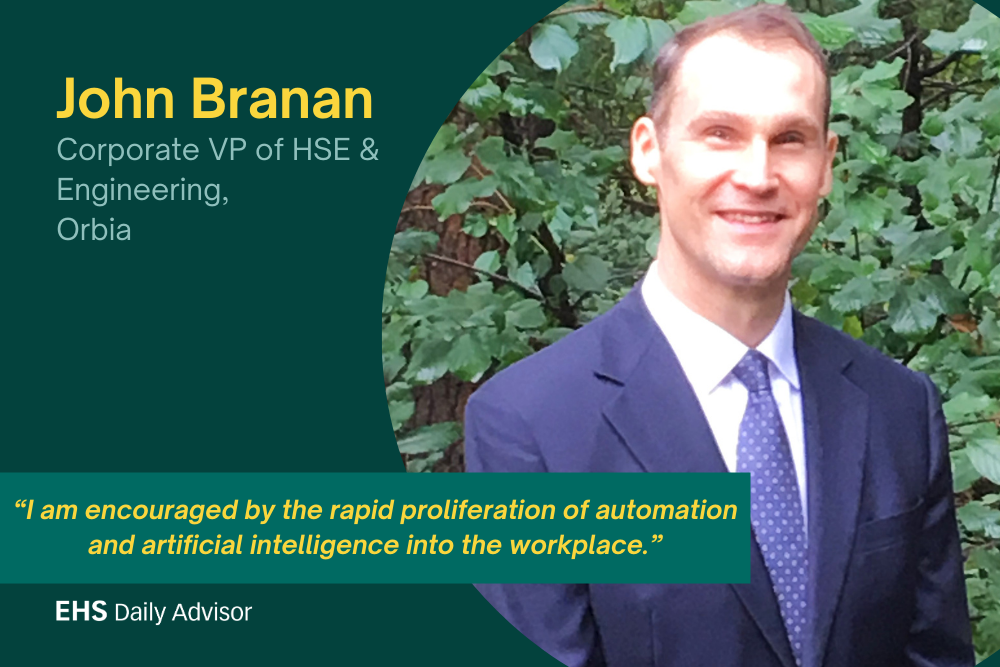Some industry veterans may be wary of new technology, but not John Branan, corporate vice president of health, safety, environment, and engineering at Orbia. He said he’s “encouraged” by how quickly safety technology is growing and looks forward to it playing a larger role in the field.
Branan has over 35 years of experience in the specialty materials and chemicals industries, with expertise in safety best practices, environmental compliance, process optimization, and strategic project execution to drive efficiencies as well as growth. He joined Orbia in 2018.
With a global team of over 24,000 employees, commercial activities in more than 100 countries, and operations in over 50, Orbia applies engineering acumen and ingenuity towards solving some of the world’s toughest challenges spanning food and water security, information access and connectivity, and decarbonization and the energy transition. The company has five distinct business groups: Polymer Solutions (Vestolit and Alphagary), Building and Infrastructure (Wavin), Precision Agriculture (Netafim), Connectivity Solutions (Dura-Line), and Fluor and Energy Materials (Koura).
Notably, Orbia recently won the ESG Champion Award as part of EHS Daily Advisor‘s 2024 Safety Standout Awards. According to Branan, “ESG principles are well-aligned with the EHS mission and are self-reinforcing and culturally consistent.”
Prior to joining Orbia, Branan held executive leadership roles spanning operations, business development, capital project engineering, and process optimization at Cabot Corp., with a focus on occupational safety, process safety, and environmental compliance.
To learn more about Branan and his take on industry issues, please read the Faces of EHS interview below:
Q: How did you get your start in the field?
I studied chemical engineering at the Georgia Institute of Technology and participated in the co-op program there. That early and extended exposure to the real-world manufacturing environment and those day-to-day challenges were a strong influence on my interest in making our sites safer and more valuable.
Q: Who has been your biggest influence in the EHS industry, and why?
I was exposed to the DuPont safety program and tools early in my career, which opened my eyes to the value of benchmarking and best practice sharing. Even today, we continue to look outward for new techniques and approaches that can improve our performance.
Q: What are some of the biggest EHS issues at your organization?
Orbia’s different business groups present a very broad and distinct set of risks to manage. The layers of protection needed in an underground mining operation in Mexico are quite different from a highly automated extrusion operation in Western Europe, which are again different from what is required for safe installation of a drip irrigation system project on a farm in Peru.
We focus our cross-business activities on life-saving rules, cultural fundamentals of safety, and universal principles of manufacturing such as “quality procedures, faithfully followed.” Then each business group is staffed and empowered to identify its own critical EHS initiatives tailored to its situations. Both types of initiatives hold equal weight in our balanced scorecard.
Q: What’s your favorite and least favorite part about working in the industry?
Orbia offers important solutions to critical world problems such as food and water security, connectivity, and the energy transition. Being a part of these important missions that advance life around the world is inspiring. Finding new and innovative ways to deliver EHS improvement faster and better than ever before is a never-ending quest—our continuous change and improvement is most encouraging!
Q: What are your thoughts on safety culture? How can company leaders make safety a value within their organization?
In Orbia, we are most fortunate to have a board of directors, CEO, and executive leadership team that are absolutely committed to world-class safety. We are all aligned behind the fundamentals of safety, such as our belief that all injuries are preventable and that our company leaders must embrace a safety culture through continuous engagement. Our safety culture emphasizes leadership and operational discipline, with a focus not only on corrective and preventive actions, but also on recognizing individual and team actions and behaviors that make us safer.
Q: What safety concerns or issues do you think need more prioritization in EHS programs?
Leadership is accountable for safety. Whenever we review an incident, we acknowledge the actions of the injured party but focus our attention on what leadership can learn and change to prevent recurrence.
Q: How will new safety technologies influence the work being done by EHS professionals?
I am encouraged by the rapid proliferation of automation and artificial intelligence (AI) into the workplace. We are in the process of making our forklift operation safer around the world through the use of camera/AI tools to mitigate the risk of vehicle-pedestrian interaction. I look forward to the day when autonomous robots can take on many of our higher-risk tasks.
Q: What are you most proud of?
Since 2018, Orbia has reduced its injury rate by 54%. That means literally hundreds of injuries that have been prevented. However, even one injury is too many, and we will not rest until everyone in our team goes home from work in the same condition that they were in when they walked through the gate, every day.
Q: Do you have any advice for people entering the EHS profession?
Spend time in the field with operations and understand their challenges.
Are you or a colleague an EHS professional interested in being profiled for the Faces of EHS series? Please contact Joe Bebon at JBebon@BLR.com.


